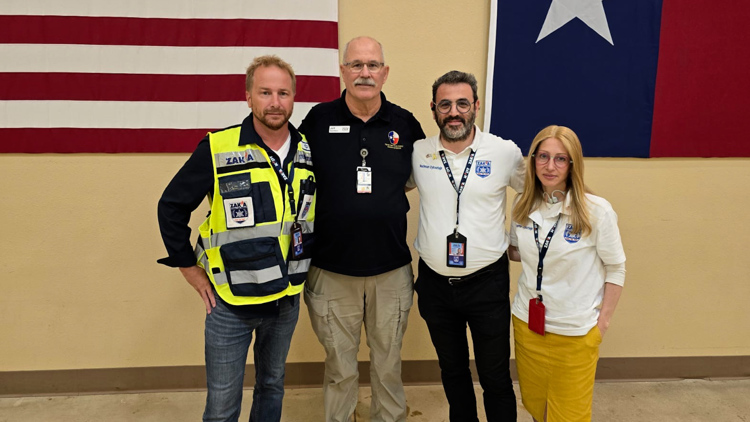A globally recognized Israeli search and rescue team is present in Kerrville, employing advanced modeling techniques alongside time-honored methods to assist in locating flood victims in the Texas Hill Country.
ZAKA Search and RescueA volunteer-driven, interfaith rescue and recovery group, ZAKA was sent from Israel following the destruction they saw on television. Even though their country is at war and commercial flights are greatly restricted, ZAKA leaders stated they felt a strong need to arrive.
We simply knew we had to be here,” said Marnix Van Ede, Director of International Relations at ZAKA. “The United States is our most significant ally, and this is just a modest way for us to show our appreciation.
ZAKA, an organization that has been active for over three decades, is recognized for its involvement in responding to global tragedies—such as 9/11, the Surfside incident, and the earthquakes in Turkey. This time, they are collaborating with Texas emergency personnel to employ cutting-edge flood modeling technology to locate where individuals might have been carried away.
It involved hydraulics and the method of determining where victims could have moved,” Van Ede stated. “This is being carried out using the latest technologies that rely on simulations. These tools guide us to clues that an average person might not have considered.
The technology—created by Professor Barak Fishbain from the Technion-Israel Institute of Technology—examines flood patterns using factors like land features, height, water speed, and regional geography. By utilizing information from Texas emergency authorities, the ZAKA team improved their models to focus on key search areas.
The computer can determine the possible directions the victims may have drifted towards,” said Van Ede. “It also involves AI calculations and simulations.
Valerie Dyksztejn, who serves as the International Deputy Commander of ZAKA and is also a software engineer, oversees the technical components of the operation, such as computer simulations. Because the data is highly confidential, Dyksztejn was only able to disclose certain models, as others included classified details regarding specific victim locations.
Although there is no Jewish community in Kerrville, ZAKA was welcomed by the local residents. A synagogue in San Antonio linked the team with a Rabbi, who organized daily deliveries of kosher meals. Local community members also provided accommodation during the team’s visit.
“The hospitality in Texas is amazing,” said Van Ede.
On-site coordination is partially managed by Nachman Dyksztejn, ZAKA’s International Commander. He mentions that the team arrived equipped with technical tools and decades of expertise—but most importantly, a mission rooted in respect.
Initially, the goal is to save lives,” stated Van Ede. “However, it also has the distinctive ability to retrieve victims and pay respect to the deceased.
ZAKA volunteers emphasize that healing goes beyond the physical—it is also emotional.
From a Jewish viewpoint, it is crucial that the individual receives a respectful burial,” Van Ede stated. “The greatest respect you can show, according to Jewish customs, is to honor the deceased. It also provides a sense of closure for the families of the victims.
ZAKA has 4,000 volunteers in Israel and an additional 2,500 spread across the globe. Their efforts are both interfaith and global in nature.
“On our teams, we also include Christians, as well as Muslims—and each tradition has its own method of commemorating the deceased,” stated Van Ede.
Although facing ongoing attacks from Iran, Lebanon, and internal instability in Israel, ZAKA officials state that their dedication to humanity surpasses national boundaries or political considerations.
We’ve visited Turkey—despite the fact that they aren’t Israel’s closest ally,” said Van Ede. “ZAKA is there to assist anyone.
The group seeks to introduce a worldwide project named ZAKA Menorah, designed to establish interfaith emergency response units capable of responding swiftly—free from bureaucratic or diplomatic constraints.
ZAKA states they will stay in Texas for as long as necessary, and they hope the models they have developed—and the collaborations they have established—will act as a template for swift, unified action in response to upcoming emergencies.



